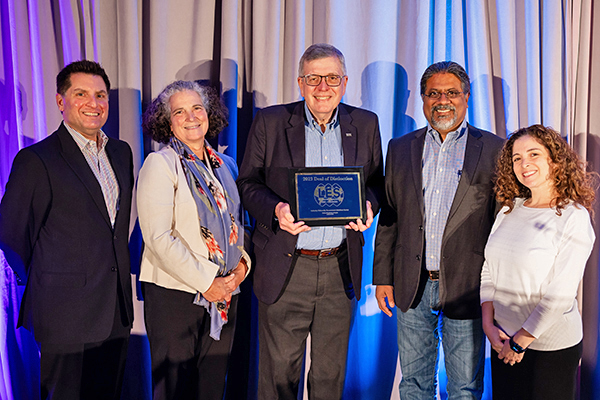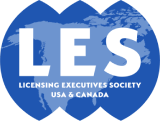LES announced the recipients of its Deals of Distinction™ Awards in four industry sectors: Brands As A Business, High-Tech, Industry-University-Government Interface and Life Sciences. The annual program, now in its nineteenth year, recognizes companies that orchestrate the year’s most outstanding licensing and business deals in each sector. The awards were presented during the LES Annual Meeting Business Luncheon on October 16, 2023. Several key dealmakers were on hand to provide insights on their winning deals.
NIH and uniCure N.V. (CSL Behring) License Brings Therapy for Hemophilia B – 3 of 4
Dealmakers: National Institutes of Health (NIH), uniCure N.V. and global partner CSL Behring
Why it won…

Steven Ferguson, NIH, shows off the award (center) with presenter Kannan Krishnaswami (right), along with Kannan’s LES IUGI co-chairs Adrian Cyhan (left), Corine Farewell and Jennifer Mandina.
For this LES “Deals of Distinction” Award, LES recognized the licenses the National Institutes of Health (NIH) intramural research program granted to uniCure N.V. based in Amsterdam, along with its global partner, CSL Behring. As a result of these licenses on November 22, 2022, the U.S. Food and Drug Administration approved Hemgenix®, the world’s first gene therapy for Hemophilia B. It represents a historic achievement based on more than two decades of research and clinical development through a government/industry partnership and license agreements. Steven Ferguson, Special Advisor, NIH Office of Technology Transfer attended the awards ceremony in person.
Hemophilia B is a serious genetic bleeding disorder that is a result of insufficient levels of blood clotting Factor IX, which is a protein needed to produce blood clots to stop bleeding. Previously, treatment involved intravenous (IV) infusions of Factor IX replacement products to aid the body’s ability to stop bleeding and prevent future bleeding episodes.
Hemgenix itself is a one-time gene therapy for treating adults living with Hemophilia B. It is an Adeno-Associated virus (AAV) vector-based gene therapy for adults with Hemophilia B or who otherwise have a life-threatening risk of hemorrhage or have repeated spontaneous bleeding episodes. The gene is expressed in the liver to produce Factor IX protein, which then allows patients to increase their blood levels of Factor IX, which in turn limits bleeding episodes.
Hemgenix was developed and launched by NIH’s licensee, uniQure, N.V., and its sublicensee, CSL Behring. NIH’s contributions were a method of delivering a heterologous nucleic acid or gene of interest to target cells using an Adeno-Associated Virus of serotype 5 (AAV5) as well as a novel method of producing the virus in insect cells.

Get Social